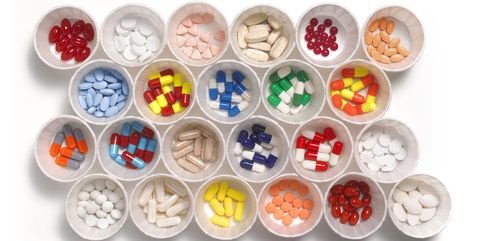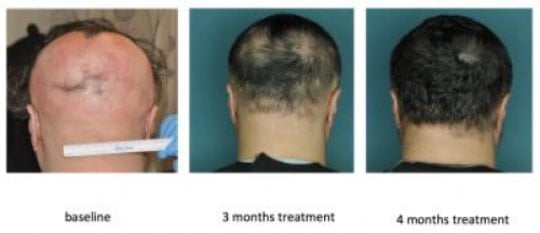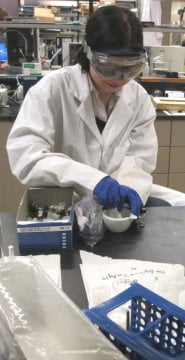
A recent study published in September in the Journal of Consulting and Clinical Psychology about children with ADHD found that using stimulant drugs — typically the first line of treatment for the cognitive disorder — doesn’t, for the most part, significantly help children finish their homework. Though some parents may never have had that experience, I couldn’t help but firmly agree. After all, that was what happened with my child.
It began when my second son was in the fourth grade. I received an email from his teacher with the subject line, “We need to talk.” My heart dropped. I’d learned over the years that it was never good news if the school reached out to me. My beliefs were confirmed when I opened the message to see this picture:
“He’s moved to doing his work on the floor because his desk is so messy he can’t sit on it, much less use it,” she wrote. “This needs to change.”
My first instinct was to write back, “You think that’s bad? You should see his room!” But I didn’t do that, because I knew she was right. Despite my best attempts to help him, my son had lived his whole life in a haze of cluttered chaos. It wasn’t that he couldn’t clean or just hated to clean, it was that he lived so much in a world that was in his own mind that he failed to notice what was going on in the real world around him. It did need to change. I sighed and scheduled the meeting with his teacher.
Within a month of that unsettling picture, my son had a diagnosis of Attention Deficit Disorder, inattentive type. His teacher suggested it (I wasn’t surprised), his pediatrician diagnosed it, and his psychiatrist medicated it with a prescription for Vyvanse.
Of course, we didn’t immediately jump to medication just based on one incident in one picture. I had suspected for a long time that he had ADHD, and it was almost a relief to have a name for the incredibly frustrating pattern of behavior that had developed over time. I’m well aware of the controversies surrounding the explosion of childhood diagnoses of ADHD, particularly in boys, but I’d been trying (and failing) for years to deal with his behavioral patterns and I was out of ideas. “Why not just try the meds? It can’t hurt and will probably help,” the doctor reassured me.
He was wrong.
At first, I thought the drugs were helping, as my son suddenly became more present and aware. But soon, something seemed off. The first sign something was going on was his sudden craving for grapefruit. He ate eight whole grapefruits a day. I don’t know why, but I’m pretty confident that the craving was linked to the Vyvanse — he’d never done that before, and on days he didn’t take it, he didn’t ask for grapefruit at all. This may sound bonkers, but grapefruits have been found to interact with many types of medications, according to the U.S. Food and Drug Administration. I called his doctor and she said it was fine while he was adjusting. But even though he was eating an insane amount of fruit, he ate little else and my already skinny boy started to become emaciated.
There were some benefits, though. He did seem to be more organized and better about getting his schoolwork done and, even more importantly, not losing it before he could turn it in.
Yet when I arrived for parent-teacher conferences, I was met with grim news: His grades weren’t better, not even a little. Surely his classroom behavior was better, right?
“Well, he’s definitely a lot more focused,” his teacher said, “just on the wrong things.” The meds, it seemed, were making him hyper-focused…on the fantasy world in his head.
After just three months on the medication, I decided that it was clear that it wasn’t working. The experiment had failed. We took him off the Vyvanse and instead got him into behavioral modification therapy specifically for teaching kids with ADHD, focusing on how to work around, and with, their different brains. It took a year of therapy, but he improved steadily and today, three years later, he’s excelling at school —and he can sit at his desk.
Our experience isn’t unusual, according to the researchers. “Long-acting stimulant medications haven’t been shown to help with homework performance despite companies advertising their utility for homework time,” wrote lead study author Brittany Merrill, a researcher at the Center for Children and Families at Florida International University in Miami. “Behavioral interventions are more effective than long-acting stimulant medications in improving homework performance among children with ADHD, and stimulant medication did not add to the effectiveness of the behavioral intervention.”
As with many studies, this one definitely has its limitations (it was only conducted with 75 kids, for starters), but it is nice to know my family isn’t alone in our experience and it’s information I wish we’d had sooner. We didn’t know about the therapy until the medications failed, and I feel like we weren’t given any other options at the time.
Let me be clear: I’m not anti-medication, or even anti-ADHD drugs. I’m sure they work for lots of adults and children. They just didn’t work for us. And, judging from this study, this may be true for other kids as well. In the struggle with ADHD, there are other options — I just wish parents were given as much information about behavioral therapies as we are about medicinal ones.
[“source-cosmopolitan”]





















